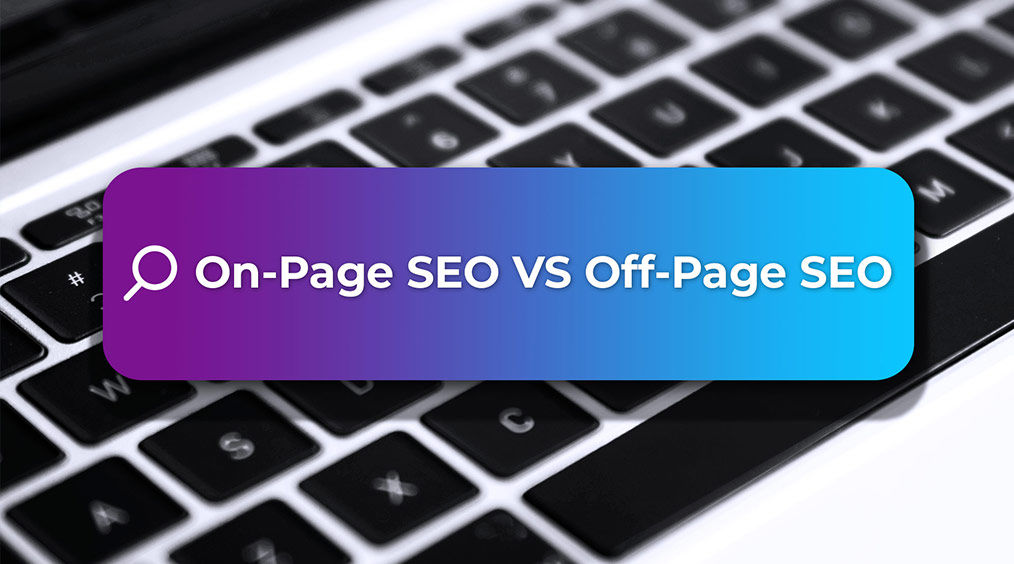Does it feel like everywhere you turn there’s another type of SEO that you need to figure out? Not to worry, we make it all understandable. This blog post explains what on-page and off-page SEO are and how they differ. We’ll also give you some pointers on how to enhance both types to improve your website traffic among other benefits.
On-page SEO, also sometimes called on-site SEO, refers to the different actions you can take that impact your website’s presentation and functionality, such as producing high-quality, keyword-focused content and improving site load speed. When done well, these actions can improve click-through rates and engagement with your target audience and can improve your ranking on different search engines. It can even help to improve your brand awareness and credibility.

It is important to optimize as many on-page details as possible. This can impact how both search engines and your audience view your website. Here’s some tips to give you a good start:
Make sure the content you create provides some level of value to your audience. Answer a question, provide additional information on the topic, or create something entertaining for your audience. Bonus points when you accomplish all three at once!
SEO keywords help search engines understand what your content is about to better index and categorize it. This decides when and where your content shows up, so choose terms that relate to the topic and have a decent search volume.
Make sure your website is easy to navigate, loads quickly, and has web content that is laid out in an understandable way. If someone has a hard time finding essential information on your website, they’re less likely to purchase or visit your site again later.
These are the descriptions and titles that will show up on the Search Engine Results Page (SERP). A catchy title and informative description can improve your click-through rates and engagement.
The internal links on your website can make it easier for search engines to crawl and can help improve its ranking on the SERP it will eventually pop up on.
Off-page SEO is any action taken outside of your website that is meant to help your rank on search engine results pages (SERPs) which will ideally lead to better brand awareness and credibility, along with increased organic site traffic. Off-page efforts may involve earning backlinks, social media marketing, guest blogs, customer reviews, and more, which all link back to your site. While some Off-page SEO can be created internally (think social media content), the best type is created organically by outside parties, such as a journalist writing an article about your business.
These kinds of optimization efforts can be a combination of created and earned media. We’ll go over some opportunities to increase your off-page SEO and the benefits that come with it.
While you “own” your social media platforms, publishing content in these spaces does count as off-page SEO. The bonus prize here is that creating engaging social media content can yield additional off-page content as people repost, share, and comment on your posts. This can also be a great opportunity to cultivate user-generated content for future social media content.
When you buy a great shirt, you are likely to talk about it and tell people where you got it from. A similar effect occurs when you create high-value content that people want to share with others. Valuable content earns backlinks more easily as you establish your position as an industry leader and a reliable resource.
Cultivating guest posts on your site and providing them on someone else’s website offers both parties benefits via backlinks and better audience exposure. This can also open the door for future brand partnerships, but we’ll get into that in a different blog.
One of the best types of off-page SEO, or earned media, is news or media coverage. This can be as easy as producing a press release that a newspaper picks up.
Depending on your business, it pays to have different off-page platforms where customers or clients can give their honest feedback, such as through Yelp or a Google My Business profile. Encourage reviews and it can serve as a valuable off-page asset to bring new leads to your website.
All the backlinks in the world won’t help your website if they are from poor-quality sources. Links from reliable and high-value sources are better than ten times as many links from mediocre, spammy sites. It is worth the time to go through your website and make sure that all your backlinks are going to viable sources first. Then, check on who is linking back to you. Make sure to disavow links from less-than-reputable websites as this could negatively impact your ranking otherwise.
If you are feeling stuck between managing your business or managing your website, then it might be time to consider getting a helping hand from our team. When you work with the specialists at Varga, you can rest assured that we’ll take your search engine optimization results up a notch. We know the tricks and tools to use to help your site perform well and allow you to get back to business without worry.









